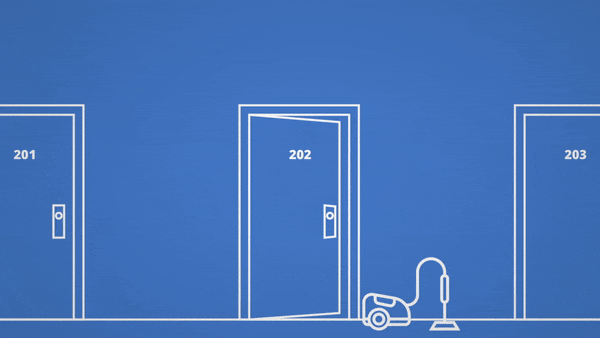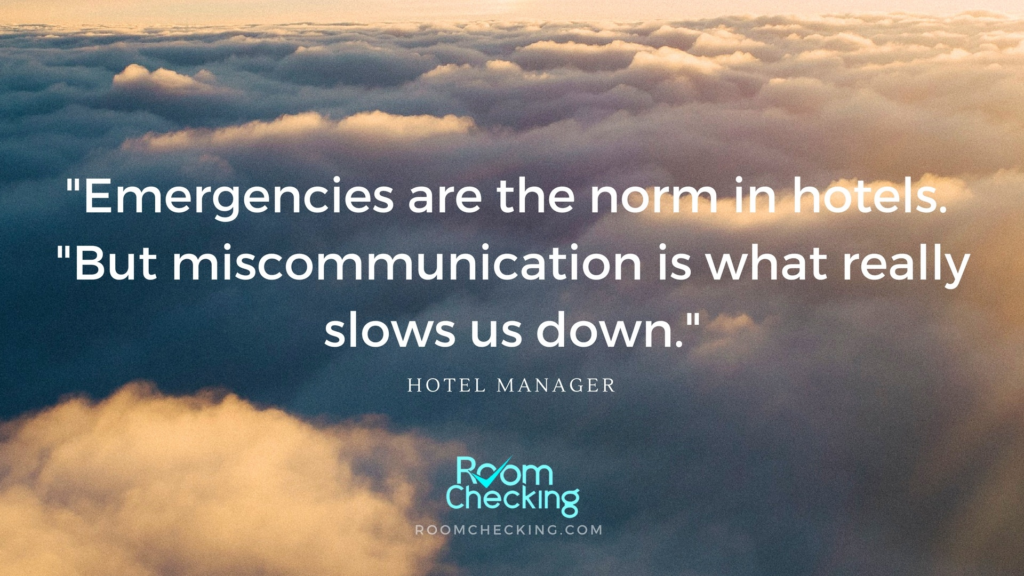
"No man is an island entire of itself. Every man is a piece of the continent, a part of the main” wrote the poet John Donne. He was talking about mankind, of course, but the concept is universal and can be applied to almost everything.
Yes, even to hotel departments: front office, housekeeping, sales and marketing and F&B are, in fact, pieces of “the continent” and “part of the main” as well. Poetry apart, the reality is that no department can work in total autonomy. What makes a hotel “a hotel” is teamwork, frictionless communication and collaboration.
Frictionless internal communication is what creates the “magic” guests feel when entering a smooth well-run hotel.
That is why coordination between departments is essential in order to offer the best guest experience possible, which is, at the end of the day, the final goal of any hotel (behind being profitable, of course).
In our experience in helping hotels, we found out that some departments seem to work naturally better together than others: sales & marketing and revenue management teams, for example, cooperate and exchange ideas and suggestion on a daily basis and even though it’s not uncommon that they disagree on certain strategies, these disagreements often lead to constructive discussions and more solid strategies.
There are some departments, on the other hand, that tend to have an intrinsic high level of friction, miscommunication and misunderstanding that, if not corrected in time, can lead to open rivalry and blame games between employees whenever something goes wrong.
Relationship between front office and housekeeping departments is probably the best example of this counterproductive dynamic. But let’s put this straight: there’s nothing wrong in these two departments per se, in fact it is safe to say that they are the pumping heart of any hotel. General Managers can take a few days off to go skiing, but with no receptionist or maids even the best hotel will inevitably crumble.
The problem relies entirely on the quality of communication between the departments. In this article we will try to understand better the reasons why communication between these two departments is so difficult and how it can be improved.
Lack of effective communication = recipe for disaster
Let’s go back to the frictionless cooperation mentioned above and let’s see what the main differences are. Sales & marketing and revenue managers often share the same office, with no distractions, no telephone ringing or guest asking over and over where the closest fast food is. If they need to solve a problem or find the best way to integrate rate strategy and paid advertising, for example, they can close the office door, focus and get the work done. With front office and housekeeping, on the other hand, this is never the case, as guest interaction (as much satisfying and enriching it might be) can be frustrating and it’s nearly impossible to be “in the zone” when you’re checking in a group of 100 guests or you still have five rooms left to clean when it’s already check in time.

Ironically, though, front office and housekeeping are the two departments more deeply linked to each other: a receptionist will not be able to assign a room until this has been cleaned and, vice versa, a maid can not know what room she should prioritize if front office does not provide a proper list with room status updates.
To understand better what could be the cause(s) of this difficult relationship, we at RoomChecking interviewed several hotels around Europe and tried to find some recurring patterns. We asked both front office and housekeeping departments four simple questions:
What is the hardest part of your job?How would you define communication between your departments and, if you could improve it, how would you?Last minute schedule change are inevitable (late check ins, early check out, etc.), how do you promptly adapt to these emergencies?Do you think technology can improve the quality of your work?
Answers were very interesting and, even though some problems seem to be universal, it looks like each hotel deals with day to day unforeseen in slightly different ways, meaning that the main problem very likely relies on the lack of company standards and precise processes when it comes to communication between these two departments.
What we discovered:
The great majority of Attendants we interviewed agreed with the fact that the hardest part of their job is to keep the cleaning standard as high as possible, even in situation of high stress (overbooking, rooms under maintenance, etc.). When it comes to family run hotels, in particular, this is always the number one concern: to provide a perfectly cleaned room in time to every guest.
We even found out that one of the main adversity that slows down the room cleaning procedure is the poor conditions in which some guests leave their rooms when they check out. We were told stories filled with nasty details, probably too graphic for this article, but if you have a strong stomach you may want to check out our article about the ten weirdest items lost & found in hotels here. This can increase dramatically the average time needed to clean up a room, with all the bad consequences that this brings.
When it comes to front office, the main issue seems to be the difficulty to get in touch with maids in cases of emergency. We can relate to that, and if you’ve ever worked on the other side of a hotel desk, you know how frustrating it is to have twenty guests waiting in front of you when you are not sure if their assigned rooms are ready or not.
According to all the answers we collected, the worst case scenario is when there’s a group checking in or a MICE event with participants sleeping at the hotel, especially when the rooming list provided is not 100% accurate and last minute changes are inevitable. This can cause delays, stress and friction, especially because it looks like front office and housekeeping departments have no real idea of the issues the other side has to face daily, so they tend to lack on empathy for their colleagues.
A General Manager we interviewed realised that this was creating misunderstandings and anger, slowing the whole process down, so he solved it using a simple yet ingenious trick: cross-training. Once a month he rotates employees of both department for a day, so that they do understand better the problems and the stress of each other. Rivalry between departments is never a good thing and it can be disastrous when it comes to front office and housekeeping, so this can be a great and inexpensive tip for your hotel.

Can you hear me, Major Tom?
Quality of communication between these two departments was definitively the question to which both answered with the same answer: in best case scenario we had a few “average” scores, but the majority were between “poor” and “complete disaster”.
It looks like every hotel we interviewed tried different approaches in order to improve communication, but no one was completely happy with the outcomes.
We heard some clever and some funny solutions, like the use of mobile phones, WhatsApp groups, Snapchats, walkie-talkies and even 90’s pagers!
Bottom line: there’s some serious improvement margin here.
Note, our CTO wrote an article with the four steps to improve hotel communications that is worth reading if you're interested in implementing a solution.
When it came to the third question, the one about last minute changes and emergencies, we honestly expected a complete different feedback, but it looks like both receptionists and maids deal with unforeseen way better than we imagined.
One hotel in particular told us (and we quote literally) that “Emergencies are the norm in hotels. We deal with them every day. But miscommunication is what really slow us down”. So, again, it seems like the biggest problem is not dealing with emergency itself but, again, the lack of coordination between departments. Once the problem is spot is usually easy to fix, but getting in touch with who has to fix it, well, that’s another story.
Afraid of Robots:
According to The Guardian, two-thirds of Americans are concerned that, in the near future, robots will perform most of the work done by humans. This fear seems unrealistic when it comes to hotels, but when we asked the question about technology we received a few replies with this tone: some hotels seemed pretty scared to integrate technology, stating that the the “human factor” can never be replaced.
Oddly, these hotels were the ones who gave the lowest score to the question about quality of communication between departments. A housekeeper of a five star hotel told us with a straight face: “we don’t need computers, we need more time!”, but when we tried to explain her that technology can actually speed up processes and “create” more time, she seemed skeptical, confirming the Guardian’s theory.
On the other hand, the majority of properties answered that they are already integrating new software in order to improve internal communication or are thinking about doing it in the near future.
Conclusions:
When we started these interviews we were already convinced that communication between departments was one of the main problems of any hotel, but we honestly did not expect to get so many replies confirming our thesis.
Here at Roomchecking, we are very proud to help hotels overcoming these difficulties through state of the art technology, created to help your staff work better, not harder.
And no, robots will not steal your job. At least not yet.

